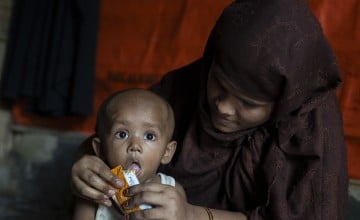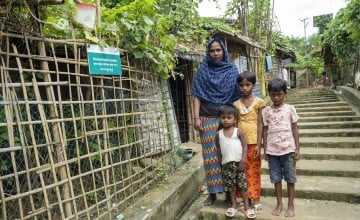
Read our 2024 annual report

Knowledge Hub
In Cox's Bazar in Bangladesh, the Rohingya people continue to arrive in the world's largest camp for refugees a full eight years into the ongoing crisis.
On August 25th, the Rohingya crisis will enter its ninth year, yet the international community continues to largely neglect the plights of people in the world's largest refugee camp.
Cox's Bazar, on the southeast coast of Bangladesh, plays host to the world's biggest refugee camps with more than 1.5 million Rohingya Muslims forced to leave their homes in neighbouring Myanmar.
That number continues to grow. In the past year alone, more than 150,000 people have arrived at the 33 camps in Cox's Bazar amid ongoing conflict in Myanmar.
The vast majority of men, women and children in the camps are living under the daily threat of malnutrition, the threat of violence, the threat of disease, and the fear that the next climate-based catastrophe could destroy the only place that they can rest their heads.
It is an unspeakable level of insecurity for anyone to live with.
"We came here out of fear"

Arshia* is 25 and the mother of four small children.
Having fled Myanmar almost a decade ago due to the violent clashes in Rakhine State, Arshia is one of the hundreds of thousands of women struggling every day to keep their children safe, fed and healthy.
“Many of my relatives and neighbours were killed in [Myanmar]. We came here out of fear," she tells us.
Arshia's youngest is little Kassim*, just 15-months-old. She describes how he became sick immediately after he was born and was in frequent need of medical attention.
“He couldn't eat properly, developed skin diseases, and had frequent fevers. Whenever we gave him medicine for the skin condition, he would get better, but it would come back again.”
Arshia would ultimately bring Kassim to a Concern-run nutrition centre.
"They first gave my child red nutrition support and then yellow nutrition. After that, they gave suji (semolina porridge).”
"I can only give them cheap fruit"
Opportunities to earn enough money within the camp to keep her family fed have been few and far between for Arshia, who used to earn money in Myanmar by selling her own fruits and vegetables.
“We endured much suffering. We couldn't buy proper medicines for the children and often faced severe financial hardship.”
Cox's Bazar is also a precarious place to be during monsoon season, with heavy rain and landslides common, while a cold wave in December 2024 that left Arshia's modest vegetable garden decimated.
She is left in a helpless situation, and only barely able to meet the nutritional needs of her young family.
“When my children ask for apples, grapes, or oranges, I cannot give them those because of a lack of money. I can only give them cheap fruit. The expensive ones are beyond my means.”
Nine out of ten children at risk of malnutrition
With a global decline in humanitarian funding and food assistance, thousands of children - 3.4% of children in the Rohingya settlements, to be exact - are at immediate risk of severe, acute malnutrition.
This represents a marked decline on previous years.
The 2025 Joint Response Plan, launched in March this year, called for $934.5m from the international community to support more than 1.5m refugees within the camps over two years. This, however, is currently only 21.7% funded and is leaving more and more people in danger of starvation in Cox's Bazar.
Arshia's situation is far from unique - all across the camps, there are people living from one day to the next, never quite knowing where their next meal is coming from.
Sokina's story

Sokina* is one of those people.
Like Arshia, she was forced to flee with a young family under the threat of extreme torture in her home country, and matters became even more desperate when her husband - who was already in poor health - died shortly after crossing the border into Bangladesh.
“We walked the entire way while coming here, and it was extremely difficult. There was no transportation available when we fled from [Myanmar] to Bangladesh," she says.
“We left [Myanmar] after eating, and only after arriving at Chammakule in Bangladesh could we have rice again. During the journey, my daughter had diarrhea, and we didn't even have spare clothes to change her into.”
The family stayed in place for six months and received materials to build a makeshift home, but they were soon displaced once again after a landslide and were left, once again, seeking support.
While she is now able to make some money selling vegetables from a small garden, enabling her to buy medicine and clothes for her children, her situation remains precarious. Storms and heavy rains have destroyed her crops before and could do so again.
“If I get the chance to work outside, I do. If there is no work, we struggle to survive with whatever we have.”
As with any parent, she worries constantly about her family.
“When my children ask for food and there’s nothing at home, they become upset, and that deeply hurts me," adds Sokina.
Concern's work in Cox's Bazar
Concern's work in Cox's Bazar focuses on improving health-related and nutritional outcomes for children under five, adolescent girls and boys, women of reproductive age, and pregnant and breastfeeding women.
In 2024, we positively impacted over 137,000 individuals through our integrated nutrition programme, offering lifesaving assistance to Rohingya families with 18 nutrition centres in the refugee camps.
We also responded to seven disasters in 11 districts, providing supports to protect lives and livelihoods
Our refugee response in Cox's Bazar includes a key focus on nutrition, and, with our UN partners' support, we manage integrated nutrition facilities to provide lifesaving services for people like Arshia, Sokina, their families and thousands of others like them.
We are also empowering local communities with vital knowledge in climate-smart agriculture to reduce loss and damage from climate-related calamities.
Our programmes integrate climate adaptation strategies, strengthen early warning systems, and promote sustainable health and nutrition interventions to protect vulnerable people against the climate crisis.
*Names have been changed.
Our impact in 2024
people reached through our emergency response
people reached through our health interventions
people reached through our livelihoods programmes


